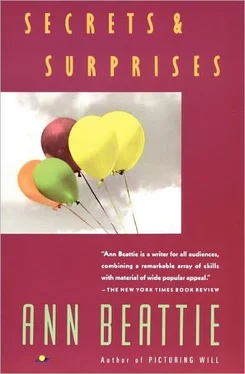“Well, if you’re going to be preposterous, go ahead and say that,” he said. “If you think about it long enough, it would make a lot of sense, wouldn’t it?”
He would not answer her question about Sarah. He kept throwing Julie’s name into it. Some other woman might then think that he was protesting too strongly — that Julie really was his lover. She thought no such thing. She also stopped suspecting Sarah, because he wanted that, and it was her habit to oblige him.
He is twenty-one years older than Lenore. On his last birthday he was fifty-five. His daughter from his first marriage (his only marriage; she keeps reminding herself that they are not married, because it often seems that they might as well be) sent him an Irish country hat. The present made him irritable. He kept putting it on and putting it down hard on his head. “She wants to make me a laughable old man,” he said. “She wants me to put this on and go around like a fool.” He wore the hat all morning, complaining about it, frightening the children. Eventually, to calm him, she said, “She intended nothing. ” She said it with finality, her tone so insistent that he listened to her. But having lost his reason for bitterness, he said, “Just because you don’t think doesn’t mean others don’t think.” Is he getting old? She does not want to think of him getting old. In spite of his ulcer, his body is hard. He is tall and handsome, with a thick mustache and a thin black goatee, and there is very little gray in his kinky black hair. He dresses in tight-fitting blue jeans and black turtleneck sweaters in the winter, and old white shirts with the sleeves rolled up in the summer. He pretends not to care about his looks, but he does. He shaves carefully, scraping slowly down each side of his goatee. He orders his soft leather shoes from a store in California. After taking one of his long walks — even if he does it twice a day — he invariably takes a shower. He always looks refreshed, and very rarely admits any insecurity. A few times, at night in bed, he has asked, “Am I still the man of your dreams?” And when she says yes he always laughs, turning it into a joke, as if he didn’t care. She knows he does. He pretends to have no feeling for clothing, but actually he cares so strongly about his turtlenecks and shirts (a few are Italian silk) and shoes that he will have no others. She has noticed that the young women who visit are always vain. When Sarah arrived, she was wearing a beautiful silk scarf, pale as conch shells.
Sitting on the floor on Saturday morning, Lenore watches the fire she has just lit. The baby, tucked in George’s chair, smiles in his sleep, and Lenore thinks what a good companion he would be if only he were an adult. She gets up and goes into the kitchen and tears open a package of yeast and dissolves it, with sugar and salt, in hot water, slushing her fingers through it and shivering because it is so cold in the kitchen. She will bake bread for dinner — there is always a big meal in the early evening when they have guests. But what will she do for the rest of the day? George told the girls the night before that on Saturday they would walk in the woods, but she does not really enjoy hiking, and George will be irritated because of the discussion the night before, and she does not want to aggravate him. “You are unwilling to challenge anyone,” her brother wrote her in a letter that came a few days ago. He has written her for years — all the years she has been with George — asking when she is going to end the relationship. She rarely writes back because she knows that her answers sound too simple. She has a comfortable house. She cooks. She keeps busy and she loves her two children. “It seems unkind to say but, ” her brother writes, “but …” It is true; she likes simple things. Her brother, who is a lawyer in Cambridge, cannot understand that.
Lenore rubs her hand down the side of her face and says good morning to Julie and Sarah, who have come downstairs. Sarah does not want orange juice; she already looks refreshed and ready for the day. Lenore pours a glass for Julie. George calls from the hallway, “Ready to roll?” Lenore is surprised that he wants to leave so early. She goes into the living room. George is wearing a denim jacket, his hands in the pockets.
“Morning,” he says to Lenore. “You’re not up for a hike, are you?”
Lenore looks at him, but does not answer. As she stands there, Sarah walks around her and joins George in the hallway and he holds the door open for her. “Let’s walk to the store and get Hershey bars to give us energy for a long hike,” George says to Sarah. They are gone. Lenore finds Julie still in the kitchen, waiting for the water to boil. Julie says that she had a bad night and she is happy not to be going with George and Sarah. Lenore fixes tea for them. Maria sits next to her on the sofa, sipping orange juice. The baby likes company, but Maria is a very private child; she would rather that she and her mother were always alone. She has given up being possessive about her father. Now she gets out a cardboard box and takes out her mother’s collection of postcards, which she arranges on the floor in careful groups. Whenever she looks up, Julie smiles nervously at her; Maria does not smile, and Lenore doesn’t prod her. Lenore goes into the kitchen to punch down the bread, and Maria follows. Maria has recently gotten over chicken pox, and there is a small new scar in the center of her forehead. Instead of looking at Maria’s blue eyes, Lenore lately has found herself focusing on the imperfection.
As Lenore is stretching the loaves onto the cornmeal-covered baking sheet, she hears the rain start. It hits hard on the garage roof.
After a few minutes Julie comes into the kitchen. “They’re caught in this downpour,” Julie says. “If Sarah had left the car keys, I could go get them.”
“Take my car and pick them up,” Lenore says, pointing with her elbow to the keys hanging on a nail near the door.
“But I don’t know where the store is.”
“You must have passed it driving to our house last night. Just go out of the driveway and turn right. It’s along the main road.”
Julie gets her purple sweater and takes the car keys. “I’ll be right back,” she says.
Lenore can sense that she is glad to escape from the house, that she is happy the rain began.
In the living room Lenore turns the pages of a magazine, and Maria mutters a refrain of “Blue, blue, dark blue, green blue,” noticing the color every time it appears. Lenore sips her tea. She puts a Michael Hurley record on George’s stereo. Michael Hurley is good rainy-day music. George has hundreds of records. His students used to love to paw through them. Cleverly, he has never made any attempt to keep up with what is currently popular. Everything is jazz or eclectic: Michael Hurley, Keith Jarrett, Ry Cooder.
Julie comes back. “I couldn’t find them,” she says. She looks as if she expects to be punished.
Lenore is surprised. She is about to say something like “You certainly didn’t look very hard, did you?” but she catches Julie’s eye. She looks young and afraid, and perhaps even a little crazy.
“Well, we tried,” Lenore says.
Julie stands in front of the fire, with her back to Lenore. Lenore knows she is thinking that she is dense — that she does not recognize the implications.
“They might have walked through the woods instead of along the road,” Lenore says. “That’s possible.”
“But they would have gone out to the road to thumb when the rain began, wouldn’t they?”
Perhaps she misunderstood what Julie was thinking. Perhaps it has never occurred to Julie until now what might be going on.
“Maybe they got lost,” Julie says. “Maybe something happened to them.”
Читать дальше












